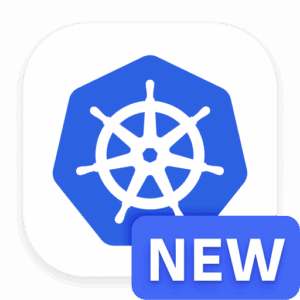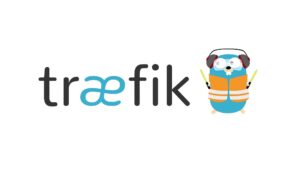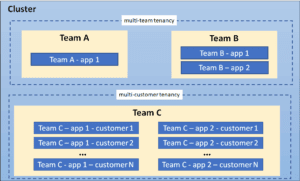Key Takeaways
Kubernetes helps FinTech startups scale applications dynamically and efficiently.
Key tools like Helm, Prometheus, and Grafana streamline deployment, monitoring, and data visualization.
Using Kubernetes ensures high availability and better resource management for financial applications.
Security and compliance features in Kubernetes are crucial for the financial sector.
Implementing Kubernetes can significantly reduce operational costs and improve time-to-market for new services.
The Kubernetes Essentials: Top Tools for Financial Tech Startups
In today’s fast-paced financial technology (FinTech) landscape, staying ahead of the competition means leveraging the right tools to ensure scalability, security, and efficiency. Kubernetes has emerged as a game-changer, offering a robust platform for managing containerized applications. But what makes Kubernetes so crucial for FinTech startups? Let’s dive in.
Why Kubernetes is Crucial for FinTech Startups
FinTech startups operate in an environment where agility and speed are paramount. Kubernetes excels in such settings by providing the ability to scale applications dynamically. Imagine a scenario where your financial application experiences a sudden spike in user activity. Kubernetes can automatically adjust resources to handle the load, ensuring seamless user experience.
Additionally, Kubernetes offers features like self-healing, which automatically replaces failed containers, and horizontal auto-scaling, which adjusts the number of running containers based on demand. These capabilities are invaluable for maintaining high availability and reliability, critical factors in the financial sector.

“Containers in the Fintech Industry” from datahubanalytics.com and used with no modifications.
Key Benefits of Utilizing Kubernetes
Besides scalability and high availability, Kubernetes brings several other benefits to the table:
Cost Efficiency: By optimizing resource usage, Kubernetes can significantly reduce operational costs.
Faster Time-to-Market: Automated deployment and management streamline the development process, allowing for quicker release cycles.
Security and Compliance: Built-in security features and compliance tools ensure that financial applications meet industry standards.
Therefore, adopting Kubernetes can be a strategic move for FinTech startups aiming to innovate rapidly while maintaining robust security and compliance standards.
Essential Kubernetes Tools for Financial Tech Startups
To harness the full potential of Kubernetes, it’s essential to leverage specific tools designed to enhance its capabilities. Here are some of the top tools every FinTech startup should consider:
Helm: Package Management for Kubernetes
Helm is often referred to as the “package manager for Kubernetes.” It simplifies the deployment and management of applications by using “charts,” which are packages of pre-configured Kubernetes resources. For more information on different deployment strategies, check out this Kubernetes deployment guide.
With Helm, you can:
Automate complex Kubernetes deployments.
Manage application versions and rollbacks easily.
Share and reuse charts across different projects.
Helm makes it easier to manage large-scale applications, reducing the complexity and time required for deployment.
Prometheus: Monitoring and Alerting
Monitoring is crucial for any financial application, and Prometheus is one of the best tools for this job. Prometheus is an open-source monitoring and alerting toolkit designed specifically for reliability and scalability. For those managing multiple environments, understanding environment variables in Kubernetes can further enhance the effectiveness of your monitoring setup.
Key features of Prometheus include:
Multi-dimensional data collection and querying.
Powerful alerting capabilities.
Easy integration with Grafana for data visualization.
By using Prometheus, FinTech startups can ensure their applications are running smoothly and can quickly identify and resolve any issues that arise.
Grafana: Data Visualization
Data visualization is essential for making sense of the metrics collected by Prometheus. Grafana is an open-source platform that provides powerful visualization and analytics capabilities.
With Grafana, you can:
Create customizable dashboards to monitor application performance.
Set up alerts based on specific metrics and thresholds.
Integrate with multiple data sources, including Prometheus.
Grafana’s intuitive interface and powerful features make it an indispensable tool for any FinTech startup looking to gain insights from their data.
Harbor: Secure Container Registry
When it comes to managing container images securely, Harbor is the go-to tool. Harbor is an open-source container image registry that secures images with role-based access control, vulnerability scanning, and image signing.
Harbor ensures that your container images are:
Stored securely with robust access controls.
Scanned for vulnerabilities before deployment.
Signed to guarantee integrity and authenticity.
By integrating Harbor into your Kubernetes workflow, you can maintain a high level of security and compliance, which is crucial for any financial tech startup. For best practices, consider following this guide on multi-container pod setup.
Implementing Kubernetes in Financial Tech Startups
Now that we’ve covered some essential tools, let’s talk about how to implement Kubernetes effectively in your FinTech startup. The process involves several steps, from setting up your environment to ensuring security and compliance.
Setting Up Your Kubernetes Environment
Setting up a Kubernetes environment might seem daunting, but breaking it down into manageable steps can simplify the process:
Choose Your Infrastructure: Decide whether to use a cloud provider like AWS, Google Cloud, or Azure, or to set up an on-premises cluster.
Install Kubernetes: Use tools like kubeadm, Minikube, or cloud provider-specific services (e.g., GKE, EKS) to install Kubernetes.
Configure Networking: Set up a network plugin (e.g., Calico, Flannel) to handle pod-to-pod communication.
Deploy Essential Tools: Install Helm, Prometheus, Grafana, Istio, and other essential tools.
Following these steps will give you a solid foundation for running Kubernetes in your FinTech startup. For more information on monitoring your Kubernetes setup, check out this guide on monitoring Kubernetes with Prometheus.
Best Practices for Deployment and Management
Deploying and managing applications on Kubernetes requires adherence to best practices to ensure efficiency and reliability:
Use Namespaces: Organize your resources into namespaces to manage them more effectively.
Implement CI/CD: Use tools like Argo to automate your continuous integration and continuous deployment pipelines.
Monitor and Log: Set up comprehensive monitoring and logging with Prometheus and Grafana to keep track of application performance and issues.
Regularly Update: Keep your Kubernetes cluster and applications up to date to benefit from the latest features and security patches.
Adopting these best practices will help you manage your Kubernetes environment more efficiently, allowing you to focus on innovation and growth.
Ensuring Security and Compliance
Security and compliance are critical in the financial sector. Kubernetes offers several features to help you meet these requirements:
Role-Based Access Control (RBAC): Use RBAC to control who can access and modify resources in your cluster.
Network Policies: Define network policies to control traffic between pods, ensuring only authorized communication.
Secrets Management: Store sensitive information like passwords and API keys securely using Kubernetes Secrets.
Vulnerability Scanning: Regularly scan your container images for vulnerabilities using tools like Harbor.
By leveraging these features, you can ensure that your Kubernetes environment meets the stringent security and compliance requirements of the financial industry.
Optimizing Resource Usage
Efficient resource usage is crucial for minimizing costs and maximizing performance. Kubernetes provides several tools and features to help you achieve this:
Horizontal Pod Autoscaling: Automatically scale the number of pods based on CPU and memory usage.
Vertical Pod Autoscaling: Adjust the resource requests and limits of your pods based on their actual usage.
Cluster Autoscaling: Automatically add or remove nodes from your cluster based on the overall resource demand.
Resource Quotas: Set resource quotas to limit the amount of CPU and memory that each namespace can use.
By implementing these strategies, you can optimize your resource usage, ensuring that your applications run efficiently and cost-effectively.
Kubernetes in Action: Real-World Use Cases
To illustrate the power of Kubernetes in the financial tech sector, let’s look at some real-world use cases where Kubernetes has made a significant impact.
Case Study: Transaction Management
One FinTech startup used Kubernetes to manage its transaction processing system. By deploying their microservices architecture on Kubernetes, they were able to:
Scale their transaction processing capabilities dynamically to handle peak loads.
Ensure high availability with Kubernetes’ self-healing features.
Reduce operational costs by optimizing resource usage with autoscaling.
This approach allowed them to process transactions more efficiently and reliably, leading to improved customer satisfaction and reduced downtime.
Case Study: Data Processing
Another FinTech company leveraged Kubernetes to handle large-scale data processing tasks. They used Kubernetes to orchestrate their data pipelines, enabling them to:
Automate the deployment and scaling of data processing jobs.
Monitor and manage resource usage to optimize performance.
Ensure data security and compliance with Kubernetes’ built-in features.
This resulted in faster data processing times and more accurate analytics, giving them a competitive edge in the market.
Case Study: Customer Service Optimization
A third example involves a FinTech startup that used Kubernetes to improve their customer service platform. By containerizing their customer service applications and deploying them on Kubernetes, they achieved:
Seamless scaling to handle increasing customer inquiries.
Enhanced reliability with Kubernetes’ self-healing capabilities.
Improved monitoring and alerting to quickly resolve issues.
This led to a better customer experience and more efficient handling of support requests, ultimately boosting customer loyalty and satisfaction. For more insights on improving performance, check out this Kubernetes case study.
Conclusion and Next Steps
In conclusion, Kubernetes offers a powerful platform for financial tech startups to scale their applications, optimize resource usage, and ensure security and compliance. By leveraging essential tools like Helm, Prometheus, Grafana, Istio, Argo, and Harbor, startups can streamline their operations and focus on innovation.
As the financial tech landscape continues to evolve, adopting Kubernetes will be crucial for staying competitive and meeting the demands of modern applications. If you’re ready to take the next step in your Kubernetes journey, contact us today to learn how we can help you implement and optimize Kubernetes for your startup.
Future Trends in Kubernetes for FinTech
The future of Kubernetes in the FinTech sector looks promising, with several trends poised to shape its evolution. Here are some key trends to watch:
Enhanced Security Features: As cybersecurity threats evolve, Kubernetes will likely incorporate more advanced security features to protect sensitive financial data.
Integration with AI and Machine Learning: Kubernetes will increasingly be used to manage AI and machine learning workloads, enabling FinTech startups to leverage advanced analytics and predictive modeling.
Serverless Architectures: The adoption of serverless computing models will grow, with Kubernetes playing a central role in managing these architectures.
Edge Computing: Kubernetes will be used to orchestrate workloads at the edge, providing real-time processing capabilities for financial applications.
Improved Developer Experience: Tools and frameworks that simplify Kubernetes management and deployment will continue to emerge, making it easier for startups to adopt and use Kubernetes effectively.
These trends indicate that Kubernetes will remain a vital technology for FinTech startups, driving innovation and enabling new capabilities.
Additional Resources to Explore
If you’re interested in learning more about Kubernetes and how it can benefit your FinTech startup, here are some additional resources to explore:
Kubernetes Documentation: The official documentation provides comprehensive information on Kubernetes features, installation, and usage.
Helm Documentation: Learn more about Helm and how to use it for managing Kubernetes applications.
Prometheus Documentation: Explore the capabilities of Prometheus for monitoring and alerting.
Grafana Documentation: Discover how to create powerful data visualizations with Grafana.
Istio Documentation: Get started with Istio and its service mesh capabilities.
These resources will provide you with the knowledge and tools you need to effectively implement and manage Kubernetes in your FinTech startup.
Frequently Asked Questions (FAQ)
What is Kubernetes and why is it important for FinTech startups?
Kubernetes is an open-source platform for automating the deployment, scaling, and management of containerized applications. For FinTech startups, Kubernetes is crucial because it provides the scalability, reliability, and security needed to handle financial applications’ dynamic and high-stakes nature.
How difficult is it to implement Kubernetes in a startup?
Implementing Kubernetes can be challenging, especially for startups with limited resources. However, by following best practices, leveraging managed Kubernetes services, and using essential tools like Helm and Prometheus, startups can simplify the process and achieve successful implementation.
What are the top security features of Kubernetes for financial tech?
Kubernetes offers several security features that are particularly valuable for financial tech, including:
Role-Based Access Control (RBAC) to manage permissions and access.
Network policies to control traffic between pods.
Secrets management for securely storing sensitive information.
Vulnerability scanning tools like Harbor to ensure container image security.
How can Kubernetes help in scaling application workloads?
Kubernetes provides several mechanisms for scaling application workloads, including:
Horizontal Pod Autoscaling to adjust the number of running pods based on CPU and memory usage.
Vertical Pod Autoscaling to adjust resource requests and limits based on actual usage.
Cluster Autoscaling to add or remove nodes based on overall resource demand.
By leveraging Kubernetes’ autoscaling capabilities, FinTech startups can dynamically adjust their resources to handle varying workloads, ensuring optimal performance and cost-efficiency.
Are there any drawbacks to using Kubernetes for small-scale financial applications?
While Kubernetes offers many benefits, there are some potential drawbacks for small-scale financial applications:
Complexity: Kubernetes can be complex to set up and manage, requiring a steep learning curve. At SlickFinch, we can manage all of this for you allowing you to focus on your application.
Resource Overhead: Running a Kubernetes cluster can introduce additional resource overhead, which may not be cost-effective for small-scale applications.
Maintenance: Regular updates and maintenance are required to keep the Kubernetes environment secure and up-to-date.
For small-scale applications, it’s essential to weigh the benefits of Kubernetes against the potential complexity and overhead. In some cases, simpler container orchestration solutions may be more appropriate.
Overall, Kubernetes offers significant advantages for FinTech startups, enabling them to scale applications dynamically, ensure high availability, and maintain robust security and compliance. By leveraging essential tools and following best practices, startups can harness the full potential of Kubernetes to drive innovation and growth in the financial tech sector. For example, monitoring Kubernetes with Prometheus Node Exporter can help maintain robust performance.




